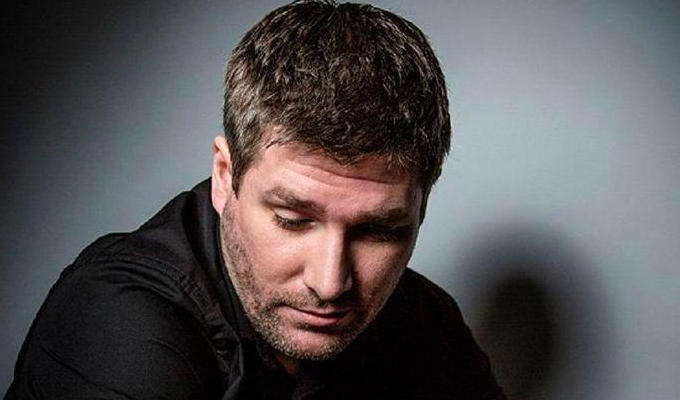
How to do the 'bucket speech'
Free Festival veteran Ollie Horn tells fellow comics how to ask Fringe audiences for money
Despite what you may hear, there are lots of stand-ups who don’t lose money when they go to the Fringe, and I’m one of them. It’s because I let my audiences in for free, perform in venues where fixed costs are comparatively low, then ask for money at the end with a so-called ‘bucket speech’.
Here are my tips for fellow comedians on how to do that bucket speech well. I hope this piece persuades them to be proud of asking their audience for money, and I hope it helps them earn more for the shows that they put on.
And perhaps it will persuade audience members who can afford to do so to pay performers what a show is truly worth…
Is it ethical to try and get more money from my audience?
The Fringe is the answer to the question ‘what is the perfect way to extract value from the artistic class and help the property-owning class get richer?’
There are Fringe-goers who spend £200 on trains, £300 on a hotel, pay £7 a pint, and they’re asked for ‘a couple of pounds in the bucket’ by well-meaning acts at excellent free shows. It’s a travesty.
The whole reason the Fringe infrastructure exists is to put on the show you’re performing, so for goodness sake don’t feel ashamed to be paid for the work you’re doing.
Free shows are great because people who can’t afford to pay for tickets can still enjoy the Fringe, while acts still get paid for the show.
It’s crowdfunding where not everybody pays the same. But it’s part of the deal that people who genuinely can’t afford a fiver are subsidised by audience members who can.
So none of these tips are designed to shame people who can’t afford to pay to cough up. They’re to help encourage the audience members who can afford to pay a meaningful contribution to your work to do just that.
Ask for money
It may seem obvious, but make sure you actually ask for money. I’ve seen acts only mention in passing at the end of their show that ‘you can chuck something in the bucket on your way out’, or worse, just let a member of venue staff stand with the bucket and hopelessly solicit donations when it’s too late.
You should make the bucket speech an integral part of your show. I think it’s better to do it just before the last routine, so you end your show by making your audience laugh instead of asking them for money, but it doesn’t really matter when you do it as long as you do it purposefully and passionately.
When you do so, make sure that you have a specific ask. There will be people in your audience who haven’t been to a pay-what-you-can (PYWC) show before, so it’s worth being explicit about how the system works.
Say a variation of ‘while you may have come in for free, the way it works is you pay what you think the show was worth at the end of the show, because this is how I get paid."
Don’t take it for granted that your audience doesn’t just think that some wealthy benefactor has means that you’re inexplicably able to put on a show for free at the largest arts festival in the world.
Be careful with your language
If you ask for ‘donations’ or ‘any change you have’ you’re likely to get considerably less money than if you ask your audience to ‘pay for the show’. The quality of your show is the same as a show that is charging for tickets (I’m presuming), so you are basically asking for them to pay for their tickets at the end. Use language that makes that clear.
When hosting the Pick Of The Fringe - Edinburgh Fringe 2022 at Chortle.co.uk">Laughing Horse Pick of the Fringe a few years ago, I ran an experiment. Rather than asking for £5, I asked for £7. The results were staggering. People responded far better to being asked for a specific and unusual amount of money than being asked for ‘a fiver’, which presumably seems more vague and arbitrary as a figure.
At Top Secret Comedy Club, we tried offering a free membership card if audiences donated £12 instead of the usual £10, and more people went for the membership card option. Consider picking a fair price for your show, and asking for that amount.
Don’t undermine your ask
For the other 57 minutes of your hour you’ve been funny, so it’s absolutely fine to have a minute or two where you are serious. Making jokes like ‘if you don’t have cash, that’s fine because I have a card reader! Ha! Got you!’ only make it seem like you’re doing something wrong by asking your audience to pay for the show, and you’ve got a card reader to trick them somehow. It’s a helpful thing that you’ve got a card reader, so frame it as such!
Don’t suggest the show is worth wildly more than it really is. For most newer acts or acts working on a work-in-progress, I think £5-7 is about right. For everyone else £8 to 12 feels fair as a top-line ask. People can always pay more or less if they think that’s what’s right for them.
Make sure you don’t undermine your ask before the show even starts too! Don’t bring people in saying ‘free comedy’ (the fact it’s free shouldn’t be the value proposition anyway, the quality of the show should be), and then seemingly change your mind at the end of the show. Be upfront with people that you will be asking for donations at the end of the show, and while not obligatory, are highly welcome.
Talk about value, not cost
While you may be feeling the financial pressures of the festival (but remember that the landlord who owns the freehold to your venue is enjoying their luxury holiday so it’s not all bad news), and while you may be thinking of your bucket money as replacing all the money that has gone out, your audience won’t enjoy hearing about it. Rather than talking about your cost, talk about the value that you’ve just offered your audience.
It’s not helpful to say ‘please help me cover my losses’. Audiences don’t know how to react to that. Instead, suggest how much the show is worth. You can do this by anchoring the value of the show to other things. You could compare the cost of a meal, a cinema ticket, or even a ticket to a paid show. Say that the show is worth £15, but you’d like everybody to pay £8 if they can.
Psychologist Ellen Langer ran an experiment that showed that using the word ‘because’ means people are more likely going to do what you’ve asked them to do, even if the reason is trite. ‘Please pay for the show, because that’s how the system works,’ is a surprisingly effective line!
If it works for you to make jokes about needing money for therapy, or a drug addiction, or to feed your kids, or because your parents don’t think that comedy is a real job, then know that lots of other people are making the same jokes, and it’s probably doing you more harm than good.
Think about logistics
You want to make it as easy as possible for your audience to pay for your show. If you’re playing to rooms of more than fifty people, consider paying a friend to stand with a second card reader to make things quick (you’ll be able to afford to pay them well!).
Consider creating a QR code to a web hosted page so they can pay with Apple Pay or Google Pay quickly. If you create friction, you’ll end up with less money.
Selling merch is a great way to upsell your audience. Saying something like ‘I’d appreciate everybody paying £6 on the way out, but if you’d like a pin badge then please offer me £8’ is a sure-fire way of not only adding on some serious extra revenue, but making your audience happy with a little keepsake. T-shirts are tough merch to sell because your time will be taken up by people trying on sizing rather than collecting money from everybody else.
Oh, and remember if you wanted to be rich, you wouldn’t be in comedy in the first place..
• Ollie Horn is performing his show Not Much at Just The Tonic from tomorrow until August 27 then touring in 2024. Tickets at olliehorn.com. Pay generously!
Published: 2 Aug 2023






